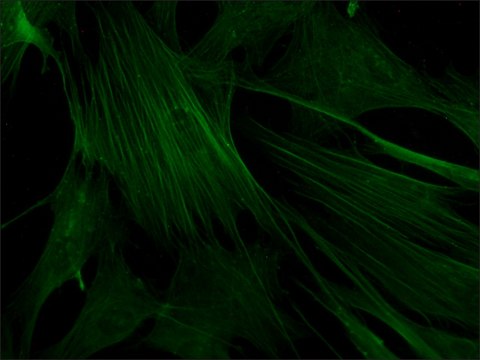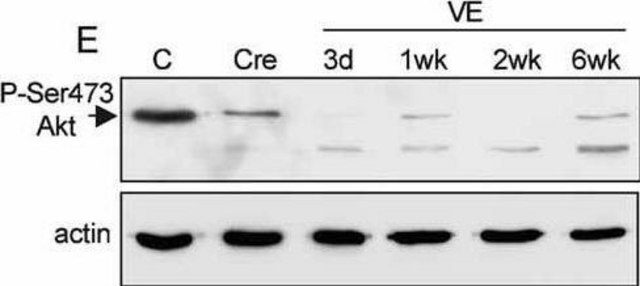ABF1207-AF488
Anti-phospho-Syk (Tyr323) Antibody, Alexa Fluor™ 488 Conjugate
from rabbit, ALEXA FLUOR™ 488
Synonym(s):
Tyrosine-protein kinase Syk, p72-Syk, p72Syk, Spleen tyrosine kinase
Sign Into View Organizational & Contract Pricing
Select a Size
All Photos(1)
Select a Size
Change View
About This Item
UNSPSC Code:
12352203
eCl@ss:
32160702
Recommended Products
General description
Tyrosine-protein kinase Syk (EC 2.7.10.2; UniProt P43405; also known as p72-Syk, p72Syk, Spleen tyrosine kinase) is encoded by the SYK gene (Gene ID 6850) in human. Spleen tyrosine kinase (Syk) is a non-receptor tyrosine kinase highly expressed by haematopoietic cells. Syk plays a crucial role not only in adaptive immune receptor signalling, but also in cellular adhesion, innate immune recognition, osteoclast maturation, platelet activation and vascular development. Syk adopts an autoinhibited conformation in its inactive state and is activated upon binding immunoreceptor tyrosine-based activation motifs (ITAMs) and phosphorylation of tyrosine residues in the two linker regions (a.a. 108-160 and 260-370) between SH1 (a.a. 15-107) and SH2 (a.a. 168-259), and between SH2 and the kinase domain (a.a. 371-631). Initial ITAM binding triggers rapid activation of Syk, whereas subsequent phosphorylation leads to prolonged activation. In additon, Syk can phosphorylate ITAMs and autophosphorylate its own link region tyrosines, providing a positive feedback loop following initial ITAM-mediated Syk activation. Syk also mediates signalling of receptors that do not contain an ITAM, including integrins and C-type lectins, via interaction with ITAM-containing adaptors, such as DAP12 (TYROBP) and the FcR gamma-chain (FcRgamma).
Specificity
Target phosphotyrosine residue coresponds to pTyr323 of human Syk spliced isoform 1 and pTyr300 of human Syk spliced isoform 2. Sequence surrounding the target tyrosine is not well conserved in mouse and rat Syk.
Immunogen
Epitope: domain of:
KLH-conjugated linear peptide corresponding to a sequence surrounding phosphorylated Tyr323 of human Syk.
Application
Detect Syk phosphorylated on tyrosine 323 using this rabbit polyclonal Anti-phospho-Syk (Tyr323), Alexa Fluor™ 488 Conjugate, Cat. No. ABF1207-AF488, validated for use in Immunocytochemistry.
Research Category
Signaling
Signaling
The unconjugated antibody (Cat. No. ABF1207) is also available for Western blotting application.
Quality
Evaluated by Immunocytochemistry in Jurkat cells.
Immunocytochemistry Analysis: A 1:100 dilution of this antibody detected Syk Tyr323 phosphorylation induction in hydrogen peroxide-treated Jurkat cells.
Immunocytochemistry Analysis: A 1:100 dilution of this antibody detected Syk Tyr323 phosphorylation induction in hydrogen peroxide-treated Jurkat cells.
Target description
~72/69 kDa observed. 72.07/69.51 kDa (human Syk isoform 1/2) calculated.
Physical form
Affinity purified.
Purified rabbit polyclonal antibody Alexa Fluor™ 488 conjugate in PBS with 1.5% BSA and 0.05% sodium azide.
Storage and Stability
Stable for 1 year at 2-8°C from date of receipt.
Other Notes
Concentration: Please refer to lot specific datasheet.
Legal Information
ALEXA FLUOR is a trademark of Life Technologies
Disclaimer
Unless otherwise stated in our catalog or other company documentation accompanying the product(s), our products are intended for research use only and are not to be used for any other purpose, which includes but is not limited to, unauthorized commercial uses, in vitro diagnostic uses, ex vivo or in vivo therapeutic uses or any type of consumption or application to humans or animals.
Not finding the right product?
Try our Product Selector Tool.
Storage Class
12 - Non Combustible Liquids
wgk_germany
WGK 2
flash_point_f
Not applicable
flash_point_c
Not applicable
Certificates of Analysis (COA)
Search for Certificates of Analysis (COA) by entering the products Lot/Batch Number. Lot and Batch Numbers can be found on a product’s label following the words ‘Lot’ or ‘Batch’.
Already Own This Product?
Find documentation for the products that you have recently purchased in the Document Library.
Our team of scientists has experience in all areas of research including Life Science, Material Science, Chemical Synthesis, Chromatography, Analytical and many others.
Contact Technical Service








